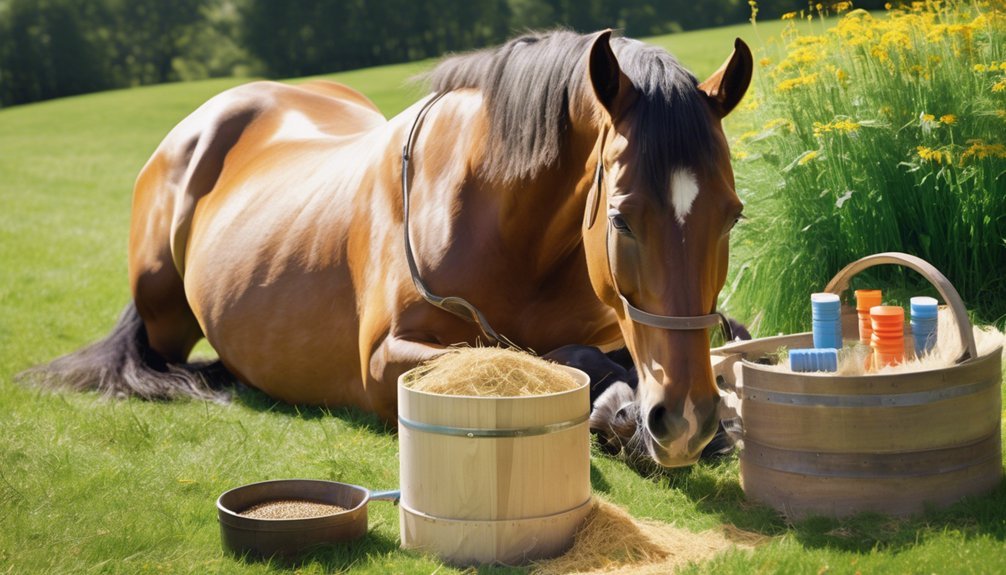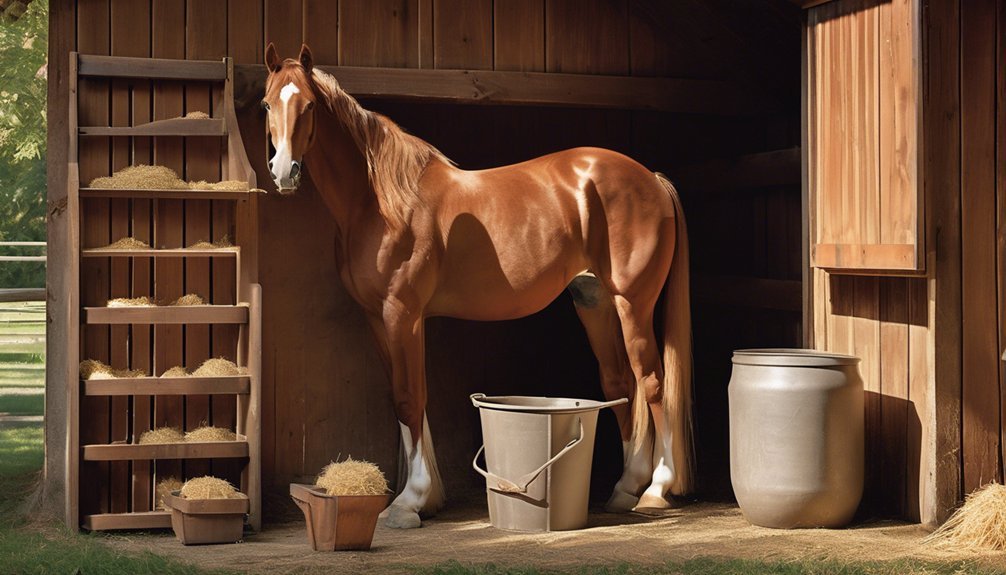
When it comes to your horse's health, can you afford to overlook the importance of proper supplementation? Introducing supplements into your horse's diet isn't just a matter of convenience; it requires a careful approach to ensure optimal nutrition. Understanding your horse's specific needs and the right products is crucial. As we explore this process, you'll discover essential steps that could significantly impact your horse's well-being.
Key Takeaways
- Start with small doses of the supplement to allow your horse to adjust and minimize digestive upset.
- Monitor your horse's response closely, noting any changes in energy, coat condition, or appetite.
- Introduce one supplement at a time to clearly identify its effects on your horse's health.
- Gradually increase the dosage as needed, based on your horse's observed response and veterinary advice.
- Keep a daily log of changes to track progress and discuss with your veterinarian for ongoing adjustments.
Understanding Your Horse's Nutritional Needs

To effectively introduce supplements into your horse's diet, you first need to understand their nutritional needs. Each horse has unique dietary requirements based on factors like age, activity level, and health status.
Achieving nutritional balance is crucial; it ensures your horse receives adequate vitamins, minerals, and macronutrients. For example, a performance horse may need higher levels of protein and electrolytes compared to a retired companion.
Assessing forage quality and grain types can help you identify gaps in their nutrition. By understanding these elements, you can select supplements that will complement their diet effectively.
Always consult with a veterinarian or equine nutritionist to create a tailored approach, ensuring your horse thrives and maintains optimal health.
Assessing the Current Diet
Assessing your horse's current diet is a vital step in determining if supplements are necessary.
Begin by reviewing the diet composition, including hay, grains, and any commercial feeds. Pay attention to the nutritional values of these components to ensure they meet your horse's specific needs.
Next, observe your horse's feeding habits. Are they eating consistently, or are there signs of picky eating? Note any changes in weight, coat condition, or energy levels, as these can indicate nutritional deficiencies.
Consider consulting with a veterinarian or equine nutritionist to analyze the information you gather. This thorough assessment will provide the foundation for deciding whether introducing supplements will enhance your horse's overall health and performance.
Identifying the Right Supplements

Once you've evaluated your horse's current diet, the next step is identifying the right supplements to address any deficiencies or enhance overall health.
Focus on specific needs based on your horse's age, activity level, and health status. If your horse shows signs of fatigue or decreased performance, consider performance enhancers designed to boost energy and stamina.
For general well-being, herbal supplements like turmeric or echinacea can support immune function and reduce inflammation. Always look for supplements that target specific issues while complementing the existing diet.
Consulting with a veterinarian can provide valuable insights into the most effective options for your horse. Tailoring your supplement choices ensures you're giving your horse the best chance for optimal health and performance.
Choosing High-Quality Products
Selecting high-quality supplements is vital to ensure your horse receives the best possible nutrients.
When choosing products, pay attention to labeling standards and ingredient sourcing. Look for:
- Clear ingredient lists that specify the sources of nutrients
- Third-party testing to confirm purity and potency
- Trusted brands with a solid reputation in equine nutrition
- Natural ingredients free from fillers and artificial additives
- Transparent manufacturing processes that prioritize quality
Gradually Introducing Supplements

When you introduce supplements to your horse's diet, it's crucial to do so gradually to prevent digestive upset and ensure a smooth transition.
Start with a slow introduction, adding a small amount of the supplement to your horse's feed. Over the course of a week or two, gradually increase the dosage based on the product's recommendations.
This method allows your horse's digestive system to adjust without overwhelming it. Make these changes in a controlled environment, monitoring for any signs of discomfort or changes in behavior.
Monitoring Your Horse's Response
After gradually introducing supplements, it's important to closely observe your horse's response to ensure they're adjusting well.
Effective response tracking involves monitoring both physical and behavioral changes. Watch for:
- Increased energy during rides
- Improved coat shine and texture
- Changes in appetite or feeding habits
- Alterations in stool quality
- Shifts in mood or temperament
These indicators will help you assess how the supplements are impacting your horse's overall health.
Keep a daily log to document any notable changes, as this can provide invaluable insights into your horse's well-being.
Adjusting Dosages as Needed

As you monitor your horse's response to supplements, you may find it necessary to adjust dosages to optimize their benefits.
Start by employing various adjustment methods, such as increasing or decreasing the supplement gradually, allowing your horse to adapt.
Pay close attention to dosage timing; administering the supplement at consistent intervals can enhance its effectiveness.
Keep an eye on your horse's behavior, energy levels, and overall health as you make these adjustments.
If you notice positive changes, you might consider maintaining the new dosage. Conversely, if adverse effects arise, reevaluate your approach.
Consulting With a Veterinarian
Adjusting dosages is just one aspect of ensuring your horse's diet is balanced and effective.
A thorough veterinary consultation is essential for a comprehensive dietary assessment. Your veterinarian can assess your horse's individual needs, ensuring that any supplements you introduce are appropriate and beneficial.
Consider discussing the following during your appointment:
- Current diet composition
- Specific health concerns
- Performance goals
- Any existing medical conditions
- Potential interactions with other treatments
Maintaining a Balanced Diet

Maintaining a balanced diet is crucial for your horse's overall health and performance, especially when introducing supplements. You need to ensure a proper nutrient balance that meets your horse's specific needs.
Start with high-quality forage, as it forms the basis of your horse's diet. The quality of the forage impacts nutrient absorption and overall health. Evaluate the forage regularly, checking for types and quantities to ensure they're optimal.
After assessing forage quality, you can strategically introduce supplements to fill any nutritional gaps. Monitor your horse's response to these changes, adjusting as necessary.
Frequently Asked Questions
Can Supplements Replace a Horse's Regular Feed Completely?
Supplements can't completely replace your horse's regular feed; they're meant to enhance nutritional balance. Relying solely on them might lead to deficiencies. Instead, consider them as feed alternatives, complementing a well-rounded diet for optimal health.
How Long Does It Take to See Results From Supplements?
You'll see results from supplements faster than a blink! Generally, expect changes within 2-4 weeks, depending on factors like supplement absorption and adherence to dosage recommendations. Consistency is key for optimal benefits in your horse's diet.
Are There Any Side Effects From Horse Supplements?
Yes, horse supplements can cause side effects, especially if you're not careful. Nutrient deficiencies might arise from improper use, while supplement overdose can lead to toxicity. Always consult your vet before starting any new regimen.
Can I Mix Different Supplements Together?
You can mix different supplements, but be cautious. Some supplement combinations may lead to negative ingredient interactions. It's wise to consult your veterinarian to ensure safety and effectiveness for your horse's unique needs.
What Is the Best Time of Day to Give Supplements?
Picture the sun rising during your morning routine; it's the perfect time to give supplements, ensuring your horse starts the day right. Evening dosage also works, maintaining consistency and maximizing absorption. Choose what suits best!
Conclusion
Incorporating supplements into your horse's diet can be a seamless process when you stay systematic and sensible. Start with careful consideration of nutritional needs, choose quality products, and introduce them gradually. Keep a close watch on your horse's reactions, adjusting dosages as necessary to ensure a healthy and happy horse. By prioritizing proper practices and maintaining a balanced diet, you're setting the stage for optimal performance and wellness, paving the path toward peak health for your equine companion.





